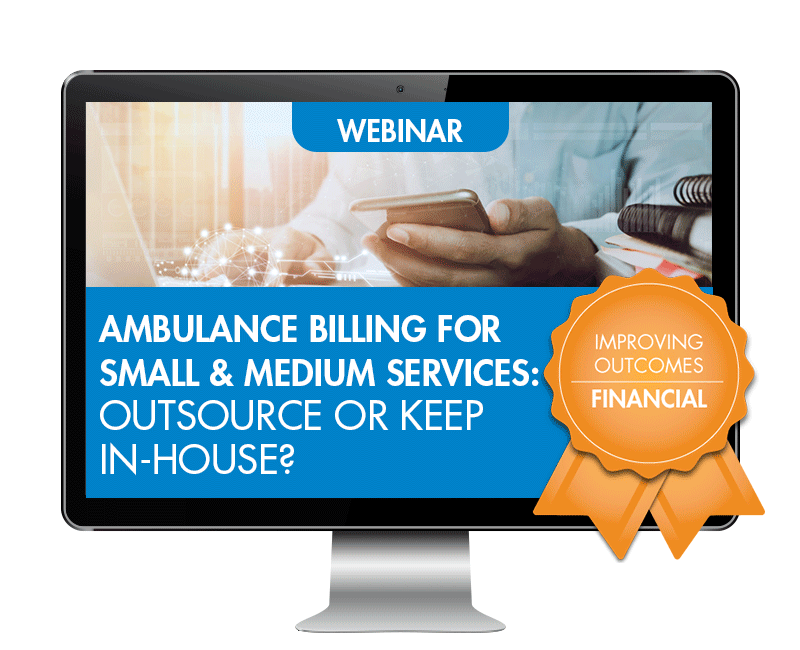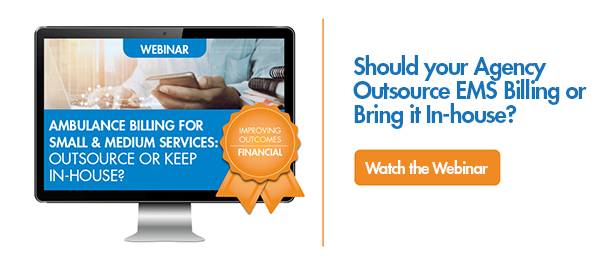Chart Smarter: Why One EMS Agency Ditched Paper for Mobile Tech
Ambulance Billing for Small and Medium Services – Outsource or Keep In-House?
Maggie Adams, president of EMS financial services recently presented a webinar on the topic of ambulance billing—is it better to keep your billing in-house or have it outsourced?

Maggie Adams, president of EMS financial services recently presented a webinar on the topic of ambulance billing—is it better to keep your billing in-house or have it outsourced?
Which one is right for your organization?
When deciding whether to outsource or keep your billing in house, a lot of organizations will ask if one fits certain types or sizes of organizations better than others. The answer is that it’s not so black and white.
“There are benefits either way. There's no right or wrong answer benefits to outsourcing,” said Adams in the webinar. “It's a very personal decision to your organization. One size does not fit all. You may decide that billing in-house is absolutely the best decision for you now and a couple of years from now it might be time to outsource.”
Adams also added that the answer can change over time: “The question to whether outsource or keep your billing in-house is a question that you should assess every couple of years see how things are going.”
So while it would be nice to have a formula to determine whether you should outsource or keep it in-house, it’s very unique to each company and there is no right or wrong answer. We’ll explore the benefits and drawbacks of both sides.
Benefits of Outsourcing
There are several ways that outsourcing can benefit your organization. First and foremost, there is the fact that good billing companies are experts in what they do.
“There is a potential for fewer billing errors because the only job of a billing company is to bill. That's all they do all day, every day.”
Additionally, having a billing company doing your work for you means that you don’t have to handle the billing staff yourself: “When outsourced, anything that happens to the billing staff is somebody else's problem.”
Finally, good billing companies usually “have good ongoing relationships with their clearinghouse,” according to Adams.
Drawbacks of Moving from In-House to Outsourced
However, there can be some complications if you are moving from in-house billing to an outsourced company.
“If you send out your uncollected claims to a collection agency they'll be collection costs.”
There are also what Adams refers to as “intangibles,” such as the impact on the community and morale.
“Is your community going to have a problem if you outsource? […] Look at your employees and your employee morale. If you have billing in-house and you're now going to outsource it, how's that going to feel to your staff?”
Before employing a billing company, however, Adams suggests that you ask them several important questions:
- How long have they done ambulance billing?
- If they’re not ambulance specific, how many ambulance billing clients do they have?
- Are their staff certified professional coders? Certified ambulance coders?
- What memberships or affiliations do they have with local state or national associations?
- What kind of reports would they routinely give you and how frequently would they get through those reports?
- Who owns the data?
- Will the billing company provide training to your field providers? How often?
Only you can determine whether the benefits of switching to outsourcing outweigh the possible drawbacks, so it’s important that you have as much information as possible before deciding.
In-House Billing Benefits
In-House Billing can be a good option for an organization too. One of the best things about it is the personal element involved when the staff is part of the community.
“In-house billing staff sometimes feel like they have such a stake in what's going on because they know the people that went out on the call; they know what went into the call; they know what's involved and they will fight tooth and nail with an insurance company to get something paid. They know this widow and what she's been through; they know the mother who lost a child. That heart that goes into an in-house biller can be a very good thing for your organization. So you can understand the geography demographics of your community and knowing the people in your community can give you an edge and support for in-house billing.”
That personal element can be key when helping the organization collect money. Adams said in the webinar that “there's a concern that people who do their billing in-house have often expressed about outsourcing and their concern is that billing services only go after the low hanging fruit and they leave the more difficult money uncollected.” But as she mentioned earlier, someone who is part of the community is more likely to fight harder to get something paid.
The personal element applies to the patients as well.
“You have less worry about alienating patients through outsourcing.”
One of the other main benefits of keeping billing in-house is the efficiency of the bi-directional communication. For example, “if someone in the billing department is looking at a trip and doesn't understand what the heck the crew meant they can get up and walk out to the garage and find that crew member, go to the crew's quarters with the trip report in hand and say ‘hey what's up?’”
This also gives you more visibility into how your accounts are being worked, so any problems can be quickly resolved.
The Downside of In-House Billing
The main drawback of in-house billing is that you are responsible for everything involved in billing, which takes not only time but appropriately trained staff. According to Adams, this training can be a bit of a hassle because the staff must always be up to date with current regulations.
“If you do billing in-house you have to look at your recruitment and training billing personnel and then you have to keep them up to date. Regulations change. All those changes mean that your people have to maintain training and keep up with compliance technology.”
The Answer?
The question of whether to insource or outsource is a complicated one with no clear answer—there are ups and downs for both. There is no right or wrong, there is only what’s right for you and your organization. Still looking for more information on the subject? Watch the full webinar:
Related Posts
The End of Delayed Documentation
4 Must-have Data Points for Dispatch-Billing Alignment and Maximum Reimbursement
ZOLL Pulse Blog
Subscribe to our blog and receive quality content that makes your job as an EMS & fire, hospital, or AR professional easier.
ZOLL Pulse Blog
Subscribe to our blog and receive quality content that makes your job as an EMS, fire, hospital, or AR professional easier.





